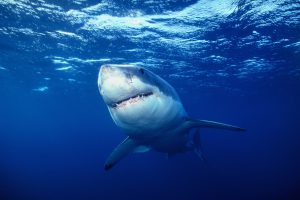Welcome to the “Shark Side”
As a Florida Sea Grant agent, I get a lot of requests for presentations related to marine organisms, from horseshoe crabs to sea turtles. But, there is one topic that always excites me and brings a smile to my face like no other: SHARKS.
I love sharks. Since I was a little kid, I have been fascinated with them. And I am not alone. A lot of people share that feeling.
Unfortunately, more people don’t.
But, I’ve learned in my career that most of the fear or dislike or even just apathy toward sharks comes from misconceptions and lack of knowledge. And every time I give a presentation about these magnificent creatures, I bring people out of the dark side and into the “Shark Side.” I get comments like: “I did not know that sharks were so cool” or “I was afraid of sharks, but now I understand that the fear was based on ignorance and sensationalism” or “I never knew that sharks were so important to us.”

Sharks are tough and successful
Sharks have been around for millions of years. The earliest shark-like teeth found come from the early Devonian Period, around 410 million years ago, or some 200 million years before the first dinosaurs appeared. This means that the amazing sharks have survived mass extinction events that decimated other life forms. And they’ve been around far longer than humans, since our first ancestors appeared just about 7 million years ago.
Learn more about shark evolution at www.nhm.ac.uk/discover/shark-evolution-a-450-million-year-timeline.html.
Sharks are extremely diverse
When most people think of a shark, they picture a white shark (Carcharodon carcharias) or a great hammerhead (Sphyrna mokarran). But, sharks come in many different sizes, colors and shapes.
There are about 500 species of sharks swimming in our oceans. Some are huge, like the whale shark (Rhincodon typus) which is the biggest fish in the ocean. A whale shark can grow to 40 feet long, or about the size of a city bus. Other sharks are tiny. The dwarf lantern shark (Etmopterus perryi), the smallest of all sharks, is no bigger than an adult’s hand.
Monterey Bay Aquarium has a short video about a few cool species of sharks found in North America: youtu.be/7RGQxmLj2fQ.
Sharks are extremely important… to us
An ocean without sharks would be unhealthy. And, frankly, pretty sad.
Sharks, especially large predatory sharks like the shortfin mako shark (Isurus oxyrinchus) or bull shark (Carcharhinus leucas), keep populations of other animals in check. Sharks are apex predators; they maintain the species below them in the food chain and serve as indicators for ocean health. Sharks help remove the weak and the sick, while keeping the balance with competitors.
Sharks are not dangerous but in danger
Fear of sharks, also known as galeophobia, is a real fear. But, often that fear stems from a lack of knowledge or simple misinformation, given a helping hand by movies like “Jaws.” Unfortunately, the poor understanding and fear of sharks has contributed to the lack of appreciation and support for these critical and beautiful creatures.
Unprovoked shark attacks have killed people, but the likelihood that you will suffer a shark attack is about 1 in 4 million. And there are many things you can do to reduce that risk still more, even if you go swimming or surfing. The Florida Museum has a wonderful site that explains more: www.floridamuseum.ufl.edu/shark-attacks/.
But, 1 in 4 shark and ray species faces extinction.
Because of us.
Human activities threaten the biodiversity of our oceans. We need to act now for the wellbeing of our oceans and ourselves. The International Union for Conservation of Nature explains more about the problems and solutions at www.iucnssg.org/global-analyses.html.
I hope after reading this, you have moved to the “Shark Side.” And don’t forget to join me for the “Sensational Sharks” webinar today. It’s free. We’re practicing social distancing (it’s online only). And you’ll hear some cool facts about sharks and what you can do to help them. Learn more and register at: www.eventbrite.com/e/sensational-sharks-webinar-tickets-101544165332.
Featured image by The Ocean Agency – stock.adobe.com
 0
0
